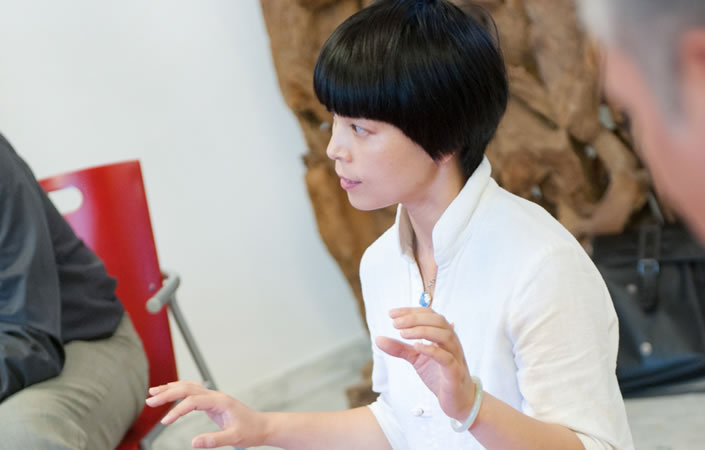
The SYNNECTA Qualification Offensive goes to China
An innovative, dialogue-oriented logistics training… in China. Is that possible? There are plenty of stereotypes about learning in China, including positive ones. However, they certainly do not include interaction between »teacher« and »students«, working on a par, fostering productive chaos and creativity. Yet, being who we are – SYNNECTA – we wouldn’t allow such stereotypes to stop us.
The background: Since 2011, we have been working with a premium automotive manufacturer to establish a modern logistics system. In our times, lean logistics processes significantly shape the success of the entire production process as a growing number of models, derivative products and production sites have increased complexity. In other words, logistics processes are significant to progress, innovation and the future success of the entire business. Next to the need to safeguard supply for the production, ever greater significance has also been awarded to cost, efficiency and process stability.
This means »hard« changes, such as optimizing and streamlining processes, raising flexibility and reducing storage spaces on the assembly lines, but also a new mindset in logistics organization. A fundamental rethink is required of all concerned. The employees have to gain an overview of the entire process and at the same time take responsibility. What needs to be sharpened is not only the establishment of logistics planning itself, but also an awareness of how such planning needs to be approached in the first place.
The SYNNECTA Learnshop
We do not want to train employees the classic way: we want to enable them to release knowledge out of themselves and to establish a new mindset in a bottom-up workshop. Initially, we do not address each production site separately (»heterogeneity instead of functionality«). We bring together employees and managers from all plants and all functions to take part in a two-day Learnshop. One SYNNECTA member teams up with an expert from the organization in order to enable all participants to learn and work together as well as learning about the culture of learning itself and experimenting with it.
In 2012, an international roll-out was started in Europe, the USA and Africa. What was special about it was that we reacted to this multicultural challenge with inter-cultural competence: a typical SYNNECTA response. We placed a »native speaker« into each of the sites abroad in order to »translate«, break down cultural barriers and address the participants according to the conventions of their own country. The results went far beyond the enactment of new strategies. The entire organisation was vitalized and long-term learning enabled. Evaluation feedback was outstanding.
We aimed to achieve the same results in the plants in China. To our surprise, our »bottom-up« approach turned out to be the smaller problem. China is undergoing great change and there are many young, open people who are more than willing to learn. Our approach moreover made it possible to address cultural barriers and engage in our client’s organizational culture. In order to dissolve the remaining cultural barriers, our first step was not to present our approach, but to listen carefully to our client in order to engage with their organizational culture. This way, we were able to eventually offer customized trainings that addressed their needs. Not least, it was important that we were able, as usual, to work in two languages: we called upon our consultants Detlef Däke and Thomas Meilinger as well as SYNNECTA consultant and native speaker Vicky Qian.
As a young, growing consultancy business without a long-standing reputation on the Chinese market but with a very well-trained Chinese team, we had to set out by earning a positive opinion of our competence. We were soon able to wow our client. We achieved that by enabling vibrant group dynamics and intense interaction, working with real and concrete case studies during the workshops.
Our approach was unusual for Chinese organizational culture. The Chinese market is fast and dynamic and companies tend to find rapid solutions for those problems that smart the most at any given moment. Vicky Qian: »Most organizations are fighting for survival. They want to take care of products, profit, the market. We, on the other hand, take care of the people, of bringing culture into the organization. This does not offer organizations a rapid solution, however: it gives them long-term paths on which they learn to recognize the relevant changes early on, to lead their employees and to continue to develop the culture as a whole.«
In the first two events, altogether 120 participants were given an insight into the processes in international logistics networks with the aid of a process image as the Big Picture. The participants were furthermore encouraged to critically question these processes. At the same time, we employed innovative dialogue methods in order to foster the development of ideas: encouraging the exchange of experience and the ability to absorb new perspectives whilst avoiding dry specialization trainings.
The careful adaptation of our methods to cultural needs and specificities are a way of effectively communicating not only change and management issues, but also demanding specialist concepts. Before this very year is out, we will conduct another three Learnshops with 180 further employees. In the Chinese production plants, our client’s logistics restructuring is already well under way. Our client’s great satisfaction already speaks for itself. We feel that our Chinese colleagues’ high skills set is a great gain. Diversity opens new perspectives; that is also true in local consultancy teams.
